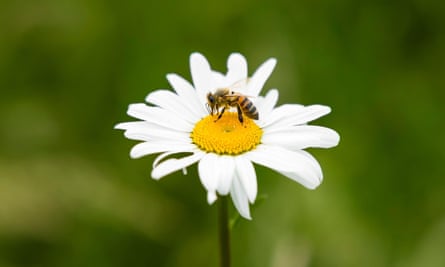[ad_1]
Adulteration of honey with cheap sugar syrup has been exposed in a new investigation by the European Commission, which found 46% of sampled products were suspected to be fraudulent. Ten honey samples from the UK all failed the tests. They may have been blended or packaged in Britain, but the honey probably originated overseas.
This is not the first time tests have suggested that UK shoppers may be being cheated on their honey, though supermarkets say they regularly test honey and audit supply lines.
The government said this weekend that it was investigating the results, but there was no risk to food safety. Officials say no single test can establish honey’s authenticity and research is continuing.
The EU’s anti-fraud office (Olaf) said: “Such practices defraud consumers and put honest producers in jeopardy as they face unfair competition from operators who can slash prices thanks to illicit, cheap ingredients.”
The action was led by the European Commission’s directorate general for health and food safety, collaborating with the 18 countries that are part of the EU food fraud network (which no longer includes the UK since Brexit). It was also supported by the Joint Research Centre (JRC), the commission’s science and knowledge service, and Olaf.
Investigators tested 320 samples and found 147 (46%) were suspicious, where “at least one marker of extraneous sugar sources was detected”.
The report last Thursday by the JCR said honey imported from the UK had a suspicion rate of 100% and “this could be the result of honey produced in other countries and further processed in the UK before its re-export to the EU”.
In 2022, the UK imported more than 38,000 tonnes of honey from its biggest supplier, China, where there is a known risk of adulteration with sugar syrup. Country of origin labelling is not required for a blended product from more than one country, so many shoppers don’t know a cheap pot of honey probably originated in China.

Lynne Ingram, master beekeeper at Wesley Cottage Bees, near Bridgwater in Somerset, who is among a group of beekeepers calling for better information for shoppers, said: “If you see honey that is cheap as 75p a jar, it is too good to be true. It’s unrealistic for people to be able to produce genuine honey at those prices.
“This shocking report is only a snapshot, but it indicated almost half the honeys were adulterated and it’s a growing problem. There is no proper enforcement or testing at the moment and people can get away with it very easily.”
Ingram suggested shoppers should choose honeys that state the country of origin on the label and ideally source it from traditional local beekeepers.
A series of tests on supermarket honey in the UK indicated that samples may be adulterated with sugar, including ones at a leading German laboratory in 2020 that found eight of the nine samples were non-compliant. Retailers and the honey industry have disputed the test results and government officials say more advanced testing technology is required.
Arturo Carrillo, the Mexico-based coordinator of the international Honey Authenticity Network, which has conducted tests on UK supermarket honey indicating adulteration, said: “The UK is flooded with very cheap adulterated honey imported from China. What is disappointing is that the British authorities have been very, very much reluctant to accept and address this tremendous problem.
after newsletter promotion
“If this study does not trigger a broad and serious investigation in the UK like the one in the EU, then either the UK are completely incompetent or they are complicit.”
The government disputes claims that honey imports are adulterated on an industrial scale. It has previously said there is “insufficient evidence” to date to indicate fraud and the enforcement is “fit for purpose”.
A spokesperson for the Department for Environment, Food and Rural Affairs said: “The UK government takes any type of food fraud very seriously – including honey adulteration. There is no place for adulterated honey which undermines consumer confidence and disadvantages responsible businesses.
“We work closely with enforcement authorities to ensure honey sold in the UK is not subject to adulteration, meets our high standards – and maintains a level playing field between honey producers.”
Officials said they would examine the result of the new study to establish whether the results are indicative of non-compliance.
Devina Sankhla, food policy adviser at the British Retail Consortium, said: “Our members work with suppliers to ensure the authenticity of their honey, conducting regular checks to ensure all honey they sell is as described. Retailers support the ongoing improvement and harmonisation of techniques to advance the detection of adulterated honey.”
[ad_2]
Source link
(This article is generated through the syndicated feed sources, Financetin doesn’t own any part of this article)
